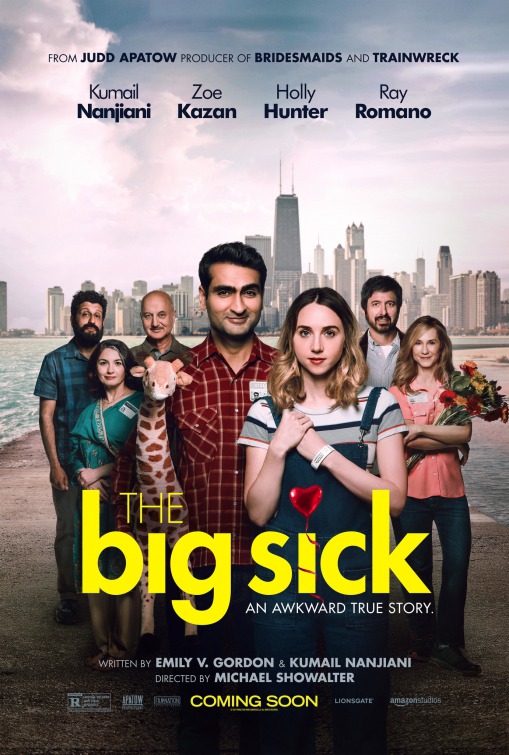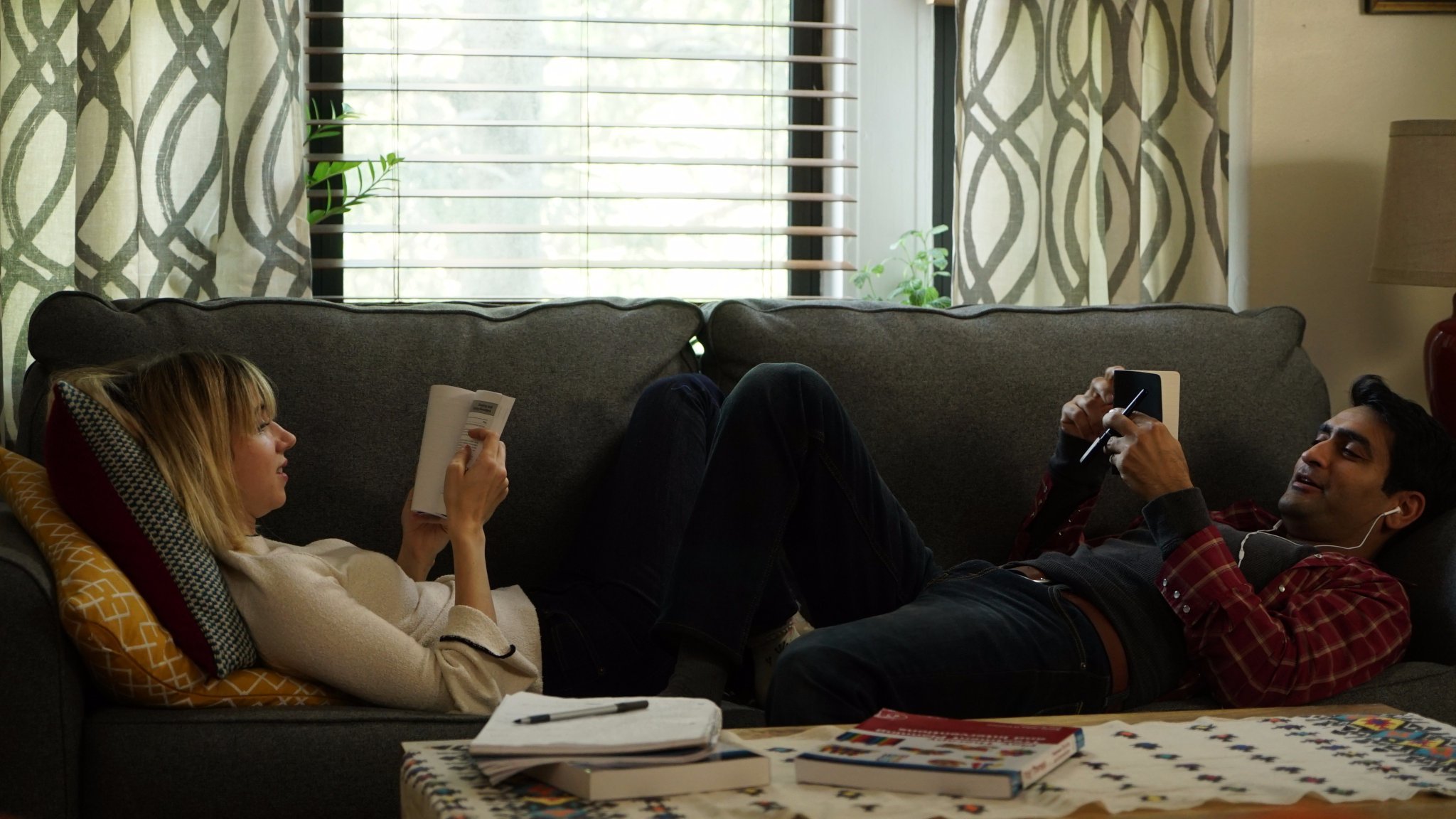 by Lynn Lee
by Lynn Lee
Judging from its early reception, The Big Sick has all the markings of a sleeper hit. Directed by Michael Showalter (My Name is Doris, Wet Hot American Summer: First Day of Camp) and written by comedian Kumail Nanjiani (best known to TV audiences as Dinesh on Silicon Valley) and his wife Emily Gordon, the movie’s loosely based on the stranger-than-fiction true story of how the couple overcame the dual barriers posed by his traditionalist Pakistani Muslim family and her medically induced coma. That’s a story you couldn’t make up, or imagine mining for laughs rather than melodrama. And yet here it is: a crowd-pleasing romantic comedy (though it’s really more of a dramedy) about a girl in a coma that’s equal parts funny and poignant without feeling the least bit exploitative.
Nanjiani plays himself, a tricky job he handles deftly, with a beguiling Zoe Kazan as the on-screen Emily,

The two meet cute at one of his stand-up routines, after she catches his attention from the audience; a one night hookup turns into another, until they find themselves falling in what looks like love and a real relationship.
However, what Kumail hasn’t told Emily, and can’t bring himself to tell her until she discovers it by accident, is that his parents don’t know she exists and that he’s been letting his mother introduce him to a succession of prospective Pakistani Muslim brides despite demonstrating no interest in any of them. Just when it looks like their romance is kaput, Emily contracts a mysterious and debilitating infection, for which she’s hospitalized and put into a coma so that the doctors can figure out the nature of her ailment. That’s when her parents (Holly Hunter and Ray Romano)—loving, worried, and deeply idiosyncratic—show up, and Kumail finds himself keeping an unlikely vigil with them at the hospital.
Not-really-a-spoiler: Emily emerges from the coma in due course, which means that The Big Sick falls naturally into three parts – Before Coma, Coma, and After Coma. By the same token, its structure is unusual as the first and third parts focus on Kumail’s relationship with Emily, while the middle and in many ways most interesting part focuses on his relationship with the parents – both his own and Emily’s. That’s no knock on Kazan, who makes Emily a vivid and charming presence: she may look like a manic pixie dream girl, but she’s no Ruby Sparks (one of her best lines is a delightfully dry comment on conforming to male tastes), nor is she anyone’s Sleeping Beauty, and she’s not afraid to tell Kumail how full of shit he is. But we’ve seen that story in some fashion before. We’ve, or at least I’ve, never seen a guy connect with his girlfriend’s parents in the way that Kumail gradually breaks the ice with Beth and Terry, and it’s a positive delight. Kumail’s mixture of awkwardness and humor plays drolly off Terry’s own awkward but kindly dad-ness and Beth’s mixture of maternal anxiety and flintiness, which softens perhaps predictably but oh so convincingly over the course of their days together. Romano and Hunter are wonderful, both individually and together, and I, for one, would love to see them cast as a couple again.

Anupam Kher and Zenobia Shroff are equally winsome as Kumail’s parents, yet I couldn’t help wishing for a little more depth, a little less of the broad, easy laughs, in the portrayal of their family dynamic. Apart from their constant (albeit reliably funny) matchmaking efforts, they really have only a couple of truly meaningful scenes that probe his conflicted feelings about them. They’re good scenes; I just wish there were more of them to balance out Kumail’s bonding time with Emily’s parents. Admittedly, it might be too much for an already bordering-on-overstuffed movie to go even further into the complexities of being a “1.5 generation” immigrant with one foot in one culture and one in another, and still maintain the general shape of a rom-com. (As it is, there’s a hint of a very different potential rom-com lurking in some of the matchmaking scenes, particularly with one of the few prospects who seems to have potential chemistry with Kumail; it’s an intriguing, even subversive, hint of an alternative view that gets squashed before it can threaten the larger narrative.) Still, I’d have liked to see more exploration of these themes through Kumail’s interactions with his family rather than, say, in his one-man show about growing up Pakistani. Relatedly, I could have done with less in general of Kumail’s comedic career, which hovers in the background without quite justifying the time spent on it.
These are obviously personal quibbles that don’t undermine what does work about the movie, which is a lot. It’s no small feat to have combined so many disparate elements together into an organic narrative that shifts registers so naturally from hilarity to heartbreak and back again. There’s nothing quite like The Big Sick out there, and particularly in these times, there’s nothing like a gentle reminder that even across vast differences in cultural values and beliefs, love can conquer all.
Grade: B/B+